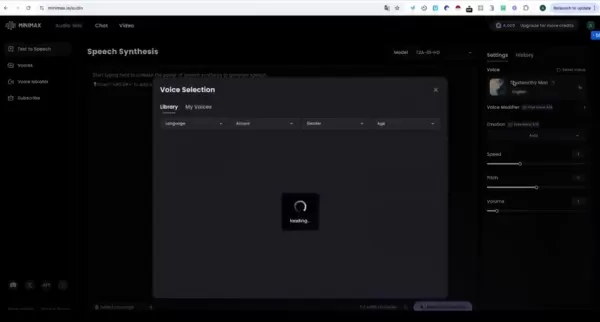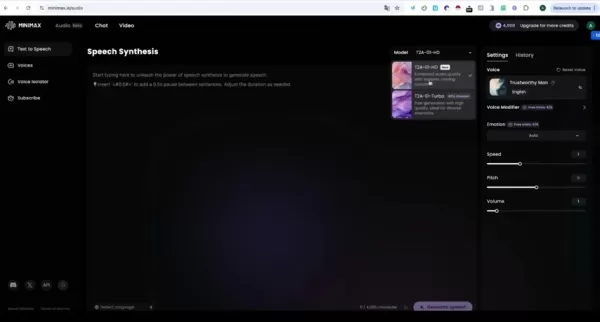Minimax vs. Cantonese.ai: Comparing the Best AI Cantonese Text-to-Speech Tools
The Rise of AI-Powered Cantonese Text-to-Speech Technology
Cantonese, with its rich tonal variations and colloquial expressions, has long posed unique challenges for text-to-speech (TTS) systems. But thanks to rapid advancements in artificial intelligence, high-quality Cantonese TTS is now more accessible than ever. In this guide, we’ll compare two leading AI platforms—Minimax and Cantonese.ai—to help you decide which one best fits your needs.
Why Cantonese TTS Is a Game-Changer
The Unique Challenges of Cantonese
Unlike Mandarin, Cantonese relies heavily on nine distinct tones, making it notoriously difficult for traditional TTS systems to replicate naturally. Additionally, the lack of extensive training datasets has historically limited the development of accurate Cantonese speech synthesis.

Key Benefits of AI-Powered Cantonese TTS
- Content Creation – Generate voiceovers for YouTube videos, podcasts, and marketing materials.
- Accessibility – Assist visually impaired users by converting written Cantonese into speech.
- Language Learning – Enhance educational tools with natural-sounding pronunciation.
- Customer Support – Power Cantonese-speaking chatbots and virtual assistants.
- Entertainment – Create audiobooks and interactive media with authentic Cantonese narration.
Minimax AI: A Multilingual TTS Solution
Overview
Minimax AI is a versatile text-to-speech platform that supports multiple languages, including Cantonese. While it offers broad functionality, its Cantonese capabilities may not be as refined as specialized alternatives.

Key Features
✔ Multi-language support (Cantonese included)
✔ Voice cloning – Upload samples to replicate your own voice
✔ Customizable AI voices – Adjust tone, speed, and accent
✔ API integration – Seamlessly embed TTS into apps
Pricing Plans
Plan Cost (HKD) Characters/Month Custom Voices Free $0 Limited 5 requests/day (watermarked) Pro $299.9 1M (~20 hrs audio) 100 voices Ultra $499.9 2M (~40 hrs audio) 100 voices

Pros & Cons
✅ Broad language support
✅ User-friendly interface
✅ Voice cloning available
❌ Less optimized for Cantonese nuances
❌ Free plan has restrictions
❌ Higher-tier plans may be costly
Cantonese.ai: A Specialist in Cantonese TTS
Why Choose a Dedicated Cantonese TTS?
While Minimax covers multiple languages, Cantonese.ai focuses solely on Cantonese, potentially offering better pronunciation accuracy and more natural intonation.
Getting Started with Minimax AI
- Log in and navigate to the TTS section.
- Input your Cantonese text in the provided box.
- Select a voice and adjust settings.
- Generate & download your audio file.

FAQ: Choosing the Right Cantonese TTS
🤔 Which AI is better for Cantonese?
- Cantonese.ai excels in accuracy for Cantonese.
- Minimax is better if you need multiple languages.
💼 Can I use these tools commercially?
Yes, but check licensing terms—some free plans restrict commercial use.
🎙️ How does AI TTS compare to human voice actors?
AI is cost-effective and scalable, but human actors still offer superior emotional depth and nuance.
Final Verdict
If Cantonese accuracy is your priority, Cantonese.ai is likely the better choice. However, if you need multi-language support and voice cloning, Minimax provides a strong alternative.
Which one will you try first? 🚀
Related article
 Best AI Tools for Creating Educational Infographics – Design Tips & Techniques
In today's digitally-driven educational landscape, infographics have emerged as a transformative communication medium that converts complex information into visually appealing, easily understandable formats. AI technology is revolutionizing how educa
Best AI Tools for Creating Educational Infographics – Design Tips & Techniques
In today's digitally-driven educational landscape, infographics have emerged as a transformative communication medium that converts complex information into visually appealing, easily understandable formats. AI technology is revolutionizing how educa
 Topaz DeNoise AI: Best Noise Reduction Tool in 2025 – Full Guide
In the competitive world of digital photography, image clarity remains paramount. Photographers at all skill levels contend with digital noise that compromises otherwise excellent shots. Topaz DeNoise AI emerges as a cutting-edge solution, harnessing
Topaz DeNoise AI: Best Noise Reduction Tool in 2025 – Full Guide
In the competitive world of digital photography, image clarity remains paramount. Photographers at all skill levels contend with digital noise that compromises otherwise excellent shots. Topaz DeNoise AI emerges as a cutting-edge solution, harnessing
 Master Emerald Kaizo Nuzlocke: Ultimate Survival & Strategy Guide
Emerald Kaizo stands as one of the most formidable Pokémon ROM hacks ever conceived. While attempting a Nuzlocke run exponentially increases the challenge, victory remains achievable through meticulous planning and strategic execution. This definitiv
Comments (6)
0/200
Master Emerald Kaizo Nuzlocke: Ultimate Survival & Strategy Guide
Emerald Kaizo stands as one of the most formidable Pokémon ROM hacks ever conceived. While attempting a Nuzlocke run exponentially increases the challenge, victory remains achievable through meticulous planning and strategic execution. This definitiv
Comments (6)
0/200
![AlbertDavis]() AlbertDavis
AlbertDavis
 July 23, 2025 at 12:59:47 AM EDT
July 23, 2025 at 12:59:47 AM EDT
This article blew my mind! I had no idea Cantonese TTS was getting this good. Minimax sounds like it’s leading the pack, but I’m curious how it stacks up against Cantonese.ai in real-world apps. Anyone tried these yet? 🤔


 0
0
![CarlGonzalez]() CarlGonzalez
CarlGonzalez
 July 6, 2025 at 9:44:34 PM EDT
July 6, 2025 at 9:44:34 PM EDT
Статья про кантонский TTS огонь! 😲 Интересно, как ИИ справляется с такими сложными тонами. Хотелось бы протестить Minimax на живом разговоре!


 0
0
![BrianBrown]() BrianBrown
BrianBrown
 July 5, 2025 at 8:29:58 PM EDT
July 5, 2025 at 8:29:58 PM EDT
这篇关于粤语TTS的文章真有意思!AI处理粤语的复杂音调感觉好厉害,Cantonese.ai听起来很酷,但会不会有点贵?😅


 0
0
![KeithLopez]() KeithLopez
KeithLopez
 July 5, 2025 at 11:59:22 AM EDT
July 5, 2025 at 11:59:22 AM EDT
This article on Cantonese TTS is super interesting! I never realized how tricky those tones are for AI. Minimax sounds promising, but I wonder how it handles slang 😎. Excited to see where this tech goes!


 0
0
![StephenGreen]() StephenGreen
StephenGreen
 July 5, 2025 at 9:42:25 AM EDT
July 5, 2025 at 9:42:25 AM EDT
この記事、めっちゃ興味深いね!広東語のTTSってこんなに進化してるんだ!MinimaxとCantonese.ai、どっちが自然かな?試してみたいな😄


 0
0
![CharlesYoung]() CharlesYoung
CharlesYoung
 July 5, 2025 at 5:40:23 AM EDT
July 5, 2025 at 5:40:23 AM EDT
Super article sur la synthèse vocale en cantonais ! Les progrès de l’IA sont impressionnants, mais je me demande si ces outils captent bien l’humour local 😜


 0
0
The Rise of AI-Powered Cantonese Text-to-Speech Technology
Cantonese, with its rich tonal variations and colloquial expressions, has long posed unique challenges for text-to-speech (TTS) systems. But thanks to rapid advancements in artificial intelligence, high-quality Cantonese TTS is now more accessible than ever. In this guide, we’ll compare two leading AI platforms—Minimax and Cantonese.ai—to help you decide which one best fits your needs.
Why Cantonese TTS Is a Game-Changer
The Unique Challenges of Cantonese
Unlike Mandarin, Cantonese relies heavily on nine distinct tones, making it notoriously difficult for traditional TTS systems to replicate naturally. Additionally, the lack of extensive training datasets has historically limited the development of accurate Cantonese speech synthesis.

Key Benefits of AI-Powered Cantonese TTS
- Content Creation – Generate voiceovers for YouTube videos, podcasts, and marketing materials.
- Accessibility – Assist visually impaired users by converting written Cantonese into speech.
- Language Learning – Enhance educational tools with natural-sounding pronunciation.
- Customer Support – Power Cantonese-speaking chatbots and virtual assistants.
- Entertainment – Create audiobooks and interactive media with authentic Cantonese narration.
Minimax AI: A Multilingual TTS Solution
Overview
Minimax AI is a versatile text-to-speech platform that supports multiple languages, including Cantonese. While it offers broad functionality, its Cantonese capabilities may not be as refined as specialized alternatives.

Key Features
✔ Multi-language support (Cantonese included)
✔ Voice cloning – Upload samples to replicate your own voice
✔ Customizable AI voices – Adjust tone, speed, and accent
✔ API integration – Seamlessly embed TTS into apps
Pricing Plans
| Plan | Cost (HKD) | Characters/Month | Custom Voices |
|---|---|---|---|
| Free | $0 | Limited | 5 requests/day (watermarked) |
| Pro | $299.9 | 1M (~20 hrs audio) | 100 voices |
| Ultra | $499.9 | 2M (~40 hrs audio) | 100 voices |

Pros & Cons
✅ Broad language support
✅ User-friendly interface
✅ Voice cloning available
❌ Less optimized for Cantonese nuances
❌ Free plan has restrictions
❌ Higher-tier plans may be costly
Cantonese.ai: A Specialist in Cantonese TTS
Why Choose a Dedicated Cantonese TTS?
While Minimax covers multiple languages, Cantonese.ai focuses solely on Cantonese, potentially offering better pronunciation accuracy and more natural intonation.
Getting Started with Minimax AI
- Log in and navigate to the TTS section.
- Input your Cantonese text in the provided box.
- Select a voice and adjust settings.
- Generate & download your audio file.

FAQ: Choosing the Right Cantonese TTS
🤔 Which AI is better for Cantonese?
- Cantonese.ai excels in accuracy for Cantonese.
- Minimax is better if you need multiple languages.
💼 Can I use these tools commercially?
Yes, but check licensing terms—some free plans restrict commercial use.
🎙️ How does AI TTS compare to human voice actors?
AI is cost-effective and scalable, but human actors still offer superior emotional depth and nuance.
Final Verdict
If Cantonese accuracy is your priority, Cantonese.ai is likely the better choice. However, if you need multi-language support and voice cloning, Minimax provides a strong alternative.
Which one will you try first? 🚀
 Best AI Tools for Creating Educational Infographics – Design Tips & Techniques
In today's digitally-driven educational landscape, infographics have emerged as a transformative communication medium that converts complex information into visually appealing, easily understandable formats. AI technology is revolutionizing how educa
Best AI Tools for Creating Educational Infographics – Design Tips & Techniques
In today's digitally-driven educational landscape, infographics have emerged as a transformative communication medium that converts complex information into visually appealing, easily understandable formats. AI technology is revolutionizing how educa
 Topaz DeNoise AI: Best Noise Reduction Tool in 2025 – Full Guide
In the competitive world of digital photography, image clarity remains paramount. Photographers at all skill levels contend with digital noise that compromises otherwise excellent shots. Topaz DeNoise AI emerges as a cutting-edge solution, harnessing
Topaz DeNoise AI: Best Noise Reduction Tool in 2025 – Full Guide
In the competitive world of digital photography, image clarity remains paramount. Photographers at all skill levels contend with digital noise that compromises otherwise excellent shots. Topaz DeNoise AI emerges as a cutting-edge solution, harnessing
 Master Emerald Kaizo Nuzlocke: Ultimate Survival & Strategy Guide
Emerald Kaizo stands as one of the most formidable Pokémon ROM hacks ever conceived. While attempting a Nuzlocke run exponentially increases the challenge, victory remains achievable through meticulous planning and strategic execution. This definitiv
Master Emerald Kaizo Nuzlocke: Ultimate Survival & Strategy Guide
Emerald Kaizo stands as one of the most formidable Pokémon ROM hacks ever conceived. While attempting a Nuzlocke run exponentially increases the challenge, victory remains achievable through meticulous planning and strategic execution. This definitiv
 July 23, 2025 at 12:59:47 AM EDT
July 23, 2025 at 12:59:47 AM EDT
This article blew my mind! I had no idea Cantonese TTS was getting this good. Minimax sounds like it’s leading the pack, but I’m curious how it stacks up against Cantonese.ai in real-world apps. Anyone tried these yet? 🤔


 0
0
 July 6, 2025 at 9:44:34 PM EDT
July 6, 2025 at 9:44:34 PM EDT
Статья про кантонский TTS огонь! 😲 Интересно, как ИИ справляется с такими сложными тонами. Хотелось бы протестить Minimax на живом разговоре!


 0
0
 July 5, 2025 at 8:29:58 PM EDT
July 5, 2025 at 8:29:58 PM EDT
这篇关于粤语TTS的文章真有意思!AI处理粤语的复杂音调感觉好厉害,Cantonese.ai听起来很酷,但会不会有点贵?😅


 0
0
 July 5, 2025 at 11:59:22 AM EDT
July 5, 2025 at 11:59:22 AM EDT
This article on Cantonese TTS is super interesting! I never realized how tricky those tones are for AI. Minimax sounds promising, but I wonder how it handles slang 😎. Excited to see where this tech goes!


 0
0
 July 5, 2025 at 9:42:25 AM EDT
July 5, 2025 at 9:42:25 AM EDT
この記事、めっちゃ興味深いね!広東語のTTSってこんなに進化してるんだ!MinimaxとCantonese.ai、どっちが自然かな?試してみたいな😄


 0
0
 July 5, 2025 at 5:40:23 AM EDT
July 5, 2025 at 5:40:23 AM EDT
Super article sur la synthèse vocale en cantonais ! Les progrès de l’IA sont impressionnants, mais je me demande si ces outils captent bien l’humour local 😜


 0
0





























